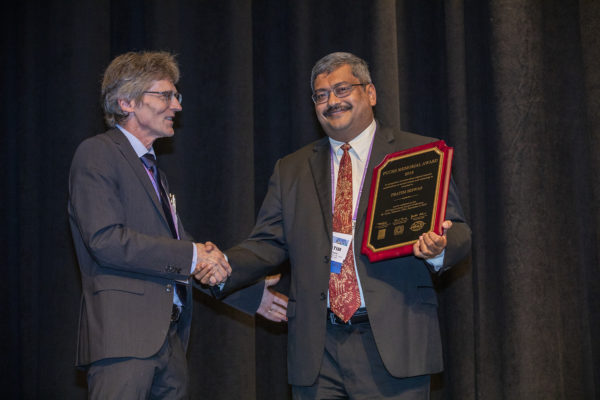This national emergency is ‘fictitious’
Stephen Legomsky, an immigration law expert at Washington University in St. Louis, comments on the Feb. 15 announcement of a state of emergency by President Donald Trump. “This much is crystal clear,” he said. “There is no national security emergency at the southern border.”
Honest diversity: A Q&A with Irshad Manji
Bestselling author Irshad Manji, keynote speaker for the fifth annual Day of Discovery, Dialogue & Action event Feb. 19 and 20, talks about her notion of moral courage and how that relates to diversity. Her talk, “Moving Beyond Labels: A Conversation About Diversity, Bigotry & Common Humanity,” begins at 5 p.m. Feb. 19 at the Eric P. Newman Education Center on the Medical Campus.
WashU Expert: Mission complete
Ray Arvidson, professor of Earth and planetary sciences and the James S. McDonnell Distinguished University Professor, talks about the end of Opportunity’s longer-than-expected 15-year mission — he was the deputy principal investigator for the Mars exploration rover for NASA.
Unmet social needs among Medicaid members lead to stress, chronic conditions
A survey of Medicaid members found that increasing levels of unmet social needs were positively associated with stress, smoking and chronic conditions, according to new research from the Brown School at Washington University in St. Louis.
From voguing to AfrikFusion
Omari Mizrahi will conduct free master classes and a Q&A on the dance style known as AfrikFusion at Washington University and COCA Feb. 20 and 21. Mizrahi, who teaches voguing and ballroom dance at the Broadway Dance Center in New York, has performed at the MTV Video Music Awards and recently was featured in Janet Jackson’s “Made for Now” video.
‘The Great Work begins’
The Performing Arts Department will debut its production of Tony Kushner’s “Angels in America: Millennium Approaches” Feb. 22 in Edison Theatre. “At the heart of the play is a question about who gets to be a citizen of this country,” said dramaturg Paige McGinley. “Gay people, people with AIDS, the addicted — these are often seen as society’s most disposable. Kushner puts them at the center of the American story.”
How America’s family-hostile policies are hurting women and children
When it comes to family-friendly policies, the United States lags far behind most European countries — and practically every other industrialized nation. But work-family conflicts don’t need to be an inevitable feature of contemporary American life, suggests a new book by Caitlyn Collins, a sociologist at Washington University in St. Louis.
Biswas elected to National Academy of Engineering
Pratim Biswas, the Lucy & Stanley Lopata Professor in the McKelvey School of Engineering at Washington University in St. Louis, has been elected to the National Academy of Engineering, considered one of the highest honors in the field of engineering.
The unintended consequences of tinkering with online prices
A new paper by a team of researchers — including two faculty from Olin Business School at Washington University in St. Louis — shows the practice of dynamic pricing can generate unintended consequences by changing the behavior of customers.
WashU Expert: Green New Deal seeks to re-start climate conversation
The Green New Deal, announced this week by Democratic members of Congress, may not amount to quick change but at least begins a conversation toward critical climate change goals, said an environmental law expert at Washington University in St. Louis.
View More Stories









